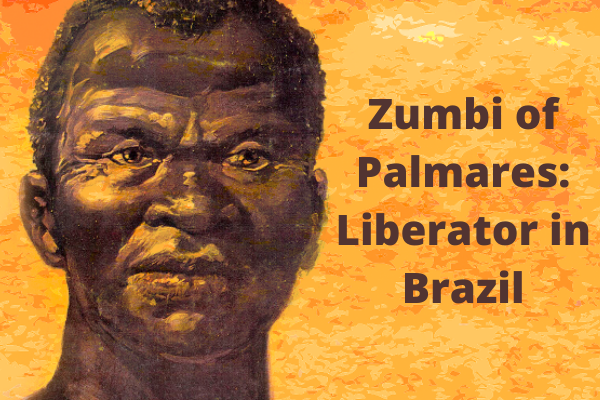
The Legacy of Zumbi of Palmares in Brazil
Zumbi (1655 – November 20, 1695), also known as Zumbi dos Palmares was a Brazilian of Kongo/Angola origin and a quilombola leader. He is one of the pioneers of resistance to slavery of Africans in Brazil. He was also the last of the kings of the Quilombo dos Palmares, a settlement of Afro-Brazilian people who had liberated themselves from enslavement in that same settlement, in the present-day state of Alagoas, Brazil.
Zumbi, is revered in Afro-Brazilian culture as a powerful symbol of resistance against the enslavement of Africans in the colony of Brazil. He was married to the queen and also great warrior Dandara.

THE LEGACY OF ZUMBI OF PALMARES SHOULD INSPIRE OUR CONTEMPORARY RESISTANCE by Paul Mileno
The Day of Black Consciousness, November 20, is the date of the assassination of Zumbi dos Palmares. In 1695, Zumbi was killed in combat for the freedom of the Brazilian people. He is a big inspiration for those who feel the spirit of fighting.
Zumbi inspires all those who are fighting for a better world; Zumbi was considered immortal. In an attempt to deface the symbolism of the myth, Zumbi’s head was exposed in a public square. Today, busts rise up in his honor to keep alive the expression ad eturnum “Zumbi lives!”
Listen to Abdias Nascimento in “O Quilombismo”: “Africans and Creoles born in Brazil, led by Zumbi, were brave masters of the Art of War. Being the most famous leader of an organization, both social and political, what does Zumbi have to teach us? Nascimento in his masterpiece Quilombismo (1980) contextualizes the mythology of Zumbi of Palmares: “…He is the founder, in practice, of the historical – cultural scientific concept of Quilombismo. Quilombismo continued by other heroes of the black history: Luísa Mahin and its son Luis Gama, Chico Rei, the hanged of the Tailors’ Revolt, Malês uprisings, Balaiada, Sea Dragon, Karocango, João Cândido, and the millions of quilombolas killed everywhere.”
However, what is the Quilombismo? It is important to draw attention that in the same year, during the 1980s, Molefi Kete Asante developed the Afrocentricity theory and Abdias developed the Quilombismo. Both thesis place Black people as the main actors in social transformation. Here are some principles and purposes on Quilombismo as Abdias Nascimento informs us:
1. Quilombismo is a political movement of Black Brazilians; it aims for the establishment of a Quilombista National State, inspired by the model of the Republic of Palmares, in the sixteenth century, and other quilombos that existed and exist in the country.
2. Quilombismo National State is based on a free, just, egalitarian and sovereign society. Quilombista democratic egalitarianism embraces gender, society, religion, politics, justice, education, culture, racial condition, economic situation; all expressions of life in society. The same egalitarianism applies to all levels of power and public and private institutions.
3. The basic purpose of the Quilombista National State is to promote the happiness of the human being. To achieve its purpose, Quilombismo believes in an economy of base – cooperative – community in the sector of production, distribution and the division of the results of collective work.
Zumbi was a descendant of Bantus, Africans born in countries like Angola, Congo, Mozambique, and others. Together with his brothers, their powerful army protected a kingdom known as Republic of Palmares, the largest and most famous Quilombo in Brazil. An African territory in Brazil, approximately one-third the size of Portugal, that also was also home to indigenous people and Whites who fought against colonial domination.
At its peak, Palmares had 30,000 inhabitants that halted the advances of Portuguese and Dutch armies from 1595 to 1695. There was 100 years of peace in the Quilombos and fire in the Big House. So there were generations of liberated Africans in Brazil that never stepped on the “Senzala”, or or camp for enslaved people, during 100 years of existence and resistance. These warriors repudiated the myth that all All Africans in Brazil during the era of slavery were enslaved. READ MORE



